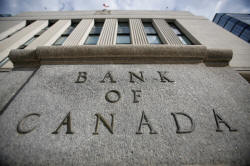Despite Omicron, Bank of Canada likely to signal earlier rate hikes
possible
 Send a link to a friend
Send a link to a friend
 [December 17, 2021] By
Fergal Smith and Steve Scherer [December 17, 2021] By
Fergal Smith and Steve Scherer
(Reuters) - With inflation surging, the
Bank of Canada is likely to change its interest rate guidance in the new
year so that it has the option to raise borrowing costs earlier than
planned despite the threat the Omicron variant poses to growth, analysts
said.
Last week when it left the key overnight rate at 0.25% - where it has
been since March 2020 - the bank reiterated its guidance, saying it
would not raise rates until economic slack has been absorbed "in the
middle quarters of 2022".
But it has turned hawkish since then, warning that inflation will run
hot for longer than expected, and Governor Tiff Macklem said the slack
in Canada's economy caused by the coronavirus pandemic has substantially
diminished.
"Even if the Bank of Canada wants to be a little bit cautious in front
of a potential winter set of shutdowns..., if they think inflation
expectations are starting to become unanchored, that will be their
primary concern," Andrew Kelvin, chief Canada strategist at TD
Securities.
"Certainly in January they will want to give themselves the option of
March," he added.

The bank will next meet to decide rates on Jan. 26, when it will also
update its forecasts. Money markets expect about four rate hikes next
year, with the first one coming in March. They see about a 40% chance of
a January move.
"January will be a declaration that every meeting is now a live meeting"
for a rate increase, said Adam Button, chief currency analyst at
ForexLive.
While the spread of Omicron could undermine growth, it could also reduce
slack in the economy more quickly by dialing back the speed at which the
economy can grow, analysts said.
"I don't think (the bank) will change course on Omicron because they'll
see that as inflationary" because it could disrupt supply chains even
further, Button said.
[to top of second column] |

A sign is pictured outside the Bank of Canada building in Ottawa,
Ontario, Canada, May 23, 2017. REUTERS/Chris Wattie/File Photo

November inflation hit nearly 5% and is starting to pinch. On Wednesday, Macklem
said the bank is getting closer to no longer providing forward guidance that
guaranteed low interest rates during the pandemic, which was seen as a signal by
some analysts that it would be dropped in January.
A shift in guidance in January would probably mean the Bank of Canada would
start raising rates ahead of the U.S. Federal Reserve, which on Wednesday said
it would speed up a phase-out of its bond-buying stimulus ahead of possibly
three interest rate rises in 2022. Lift-off by the Fed is expected by money
markets in June.
The Bank of England on Thursday became the world's first major central bank to
raise borrowing costs since the coronavirus pandemic hammered the global
economy.
A bevy of Canadian economic data, including December jobs and inflation, will
set the tone for January meeting. While most economists are skeptical about an
increase as early as January, it is not impossible, said Doug Porter, chief
economist at BMO Capital Markets.
"Never say never. I definitely can't rule it out," Porter said. "We'll have lots
of data by then," he said, adding that the figures would have to all point in
"one direction" and create a sense of urgency for the bank to move so quickly.
(Reporting by Fergal Smith in Toronto and Steve Scherer in Ottawa; Editing by
Lisa Shumaker)
[© 2021 Thomson Reuters. All rights
reserved.] Copyright 2021 Reuters. All rights reserved. This material may not be published,
broadcast, rewritten or redistributed.
Thompson Reuters is solely responsible for this content.
 |